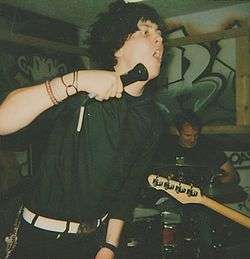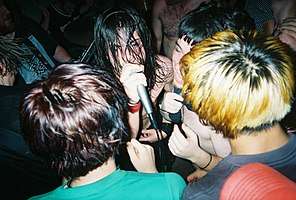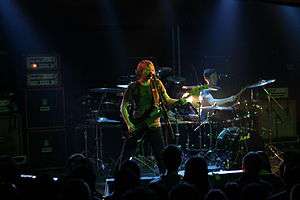Screamo
Screamo (also referred to as skramz)[1] is an aggressive subgenre of emo that emerged in the early 1990s, emphasizing "willfully experimental dissonance and dynamics."[2] It was pioneered by San Diego bands Heroin and Antioch Arrow and developed in the late 1990s mainly by bands from the East Coast of the United States such as Orchid, Saetia, and Pg. 99. Screamo is strongly influenced by hardcore punk and characterized by the use of screamed vocals.[3] Lyrical themes usually include emotional pain, death, romance, and human rights.[4] In the 21st century, the term "screamo" has often mistakenly been used as an umbrella term for any music that features screamed vocals.[3][5]
| Screamo | |
|---|---|
 Orchid performing in 2000. | |
| Other names | Skramz |
| Stylistic origins | |
| Cultural origins | Early 1990s, San Diego, California, U.S. |
| Typical instruments | |
| Other topics | |
Screamo experienced popularity in the 2000s with the success of bands like Thursday, The Used, Underoath, Silverstein, Hawthorne Heights and Senses Fail. The genre's popularity declined in the 2010s but continued to have underground success with bands like La Dispute and Pianos Become the Teeth.
Terminology
While the genre was developing in the early 1990s, it was not initially called "screamo."[6] Chris Taylor, lead vocalist for the band Pg. 99, said "we never liked that whole screamo thing. Even during our existence, we tried to venture away from the fashion and tell people, 'Hey, this is punk.'"[7] Jonathan Dee of The New York Times wrote that the term "tends to bring a scornful laugh from the bands themselves."[8] Lars Gotrich of NPR Music made the following comment on the matter in 2011:[7]
The screamo scene [has] change[d] a lot in the last 10 years. There used to be more creative bands like Circle Takes the Square and City of Caterpillar. And then it took this route where screamo got really streamlined and unrecognizable to the point where someone hilariously invented the term skramz to distinguish the first wave of screamo bands.
In the 2000s the term "screamo" began being used loosely to describe any use of human vocal instrument growled-word vocals (commonly termed screamed vocals) in music.[3] It has been applied to a wide variety of genres unrelated to the original screamo scene.[9] Juan Gabe, vocalist for the band Comadre, alleged that the term "has been kind of tainted in a way, especially in the States."[10] Derek Miller, guitarist for the band Poison the Well noted the term's constant differing usages and jokingly stated that it "describes a thousand different genres."[9] Bert McCracken, lead singer of The Used, stated that screamo is merely a term "for record companies to sell records and for record stores to categorize them."[11]
History
Origins (1990s)

Screamo arose as a distinct music genre in 1991, in San Diego, at the Ché Café,[12] including bands such as Heroin and Antioch Arrow.[13] Gravity Records[14][15] and Ebullition Records[6] released this more chaotic and expressive descendant of emo. The scene is noted for its distinctive fashion sense, inspired by mod culture.[16] As with emo, the term screamo carries some controversy among participants.[2]
Many groups from the East Coast were influential in the continual development and reinvention of the style, including Orchid,[17][18] Pg. 99, Saetia,[19] City of Caterpillar,[3] Jeromes Dream, Circle Takes the Square, Hot Cross, and Ampere.[20]
Mainstream crossover (2000s)


By 1995, the term "screamo" drifted into the music press, especially in the journalism of Jim DeRogatis and Andy Greenwald,[4] and by the mid-2000s, the term was being applied to many newer bands.[3] Screamo bands such as The Used, Thrice, Finch, Thursday, Alexisonfire, and Silverstein developed a newer period of screamo in the 21st century.[3][21][21] Thursday cited the post-punk band Joy Division, and the post-hardcore band Fugazi as important influences, but also took cues from the alternative rock styles of Radiohead, U2, and The Cure.[22][23] Many of these bands took influence from bands like Refused and At the Drive-In.[3] In contrast to the do-it-yourself screamo bands of the 1990s, screamo bands such as Thursday and The Used have signed multi-album contracts with labels such as Island Def Jam and Reprise Records.[24] However, this style's connection to the genre has been disputed, with some referring to it as "MTV screamo"[1] or "pop-screamo", and many bands more commonly being categorized as post-hardcore or metalcore.[25] Alternative Press describes pop screamo as "metal-influenced riffs and aggressive, high-end screams filled song’s verses, while soaring melodies carried choruses to new, previously unattained heights."[25]
The term "post-screamo" has been used loosely to describe a wide variety of music in the 2000s and later that was influenced by traditional screamo.[26][27][28] In a review of City of Caterpillar's influence on the genre, reporter Jason Heller of Vice writes "Call it post-screamo, if you must. Okay, maybe don’t do that. But .... the early 00s weren’t the end of an era or anything so corny. It was just a transition."[28]
In the mid-2000s the style of early screamo regained vitality, with American bands like Comadre,[10] Off Minor, and Hot Cross releasing records on independent labels. The contemporary screamo scene has remained particularly active in Europe, with bands such as Amanda Woodward,[29] Louise Cyphre,[30] Le Pré Où Je Suis Mort,[31] La Quiete, Daïtro,[32] and Raein all being prime examples of their scene. Fluff Fest, held in Czechia since 2000, was in 2017 described by Bandcamp Daily as a "summer ritual" for many fans of screamo in Europe.[33]
Revival (2010s)
In the early 2010s the term "screamo" began to be largely reclaimed by a new crop of do-it-yourself bands, with many screamo acts, like Loma Prieta, Pianos Become the Teeth, La Dispute, and Touché Amoré releasing records on fairly large independent labels such as Deathwish Inc.[34] In 2011 Alternative Press noted that La Dispute is "at the forefront of a traditional-screamo revival" for their critically acclaimed release Wildlife.[35] They are a part of a group of stylistically similar screamo-revival bands self-defined as "The Wave," made up of Touché Amoré, La Dispute, Defeater, Pianos Become the Teeth, and Make Do and Mend.[36][37] As well as, California's Deafheaven, who formed in 2010, having been described as screamo, in a style similar to that of Envy.[38] Alternative Press has cited a "pop screamo revival" along with this, with bands like Before Their Eyes, The Ongoing Concept, Too Close to Touch and I Am Terrified.[39]

In August 2018, Noisey writer Dan Ozzi declared that it was the "Summer of Screamo" in a month-long series documenting screamo acts pushing the genre forward following the decline in popularity of "The Wave," as well as the reunions of seminal bands such as Pg. 99, Majority Rule, City of Caterpillar,[40] and Jeromes Dream.[41][42] Groups highlighted in this coverage, including Respire,[43][44] Ostraca,[45] Portrayal of Guilt,[46][47][48] Soul Glo,[49] I Hate Sex,[50] and Infant Island,[51][52][53] had generally received positive press from large publications, but were not as widely successful as their predecessors. Noisey also documented that, despite its loss of mainstream popularity and continued hold in North American scenes, particularly Richmond, Virginia,[54] screamo had become a more international movement; notably spreading to Japan, France, and Sweden with groups including Heaven in Her Arms, Birds in Row, and Suffocate for Fuck Sake, respectively.[55] Also in 2018, Vein released their debut album Errorzone to critical acclaim and commercial success, bringing together elements of screamo, hardcore, and nu metal.[56][57][58] This underground cohort of acts was primarily released by independent labels like Middle-Man Records[59] in the United States, Zegema Beach Records[60] in Canada, and Miss The Stars Records in Berlin.[61]
Characteristics
Screamo is a style of hardcore punk-influenced emo with screaming.[3] Alex Henderson of AllMusic considers screamo a bridge between hardcore punk and emo.[63] The term screamo is a portmanteau of the words "scream" and "emo." Screamo uses typical rock instrumentation, but is notable for its brief compositions, chaotic sounds, harmonized guitars, and screaming vocals.[64] Screamo is characterized "by frequent shifts in tempo and dynamics and by tension-and-release catharses."[8] Many screamo bands also incorporate ballads.[64] According to AllMusic, screamo is "generally based in the aggressive side of the overarching punk-revival scene."[3] Screamed vocals are used "not consistently, but as a kind of crescendo element, a sonic weapon to be trotted out when the music and lyrics reach a particular emotional pitch."[8] Emotional singing and harsh screaming are common vocals in screamo.[3]
.jpg)
Screamo lyrics often feature topics such as emotional pain, breakups, romantic interest, politics, and human rights.[4][65] These lyrics are usually introspective, similar to that of softer emo bands.[3] The New York Times noted that "part of the music's appeal is its un-self-conscious acceptance of differences, respect for otherness." Some screamo bands openly demonstrate acceptance of religious, nonreligious, and straight edge lifestyles[8]
Many screamo bands in the 1990s saw themselves as implicitly political, and as a reaction against the turn to the right embodied by California politicians, such as Roger Hedgecock.[16] Some groups were also unusually theoretical in inspiration: Angel Hair cited surrealist writers Antonin Artaud and Georges Bataille,[2] and Orchid lyrically name-checked French new wave icon Anna Karina, German philosopher Friedrich Nietzsche, French philosopher Michel Foucault, and critical theory originators the Frankfurt School.[66]
Subgenres
Emoviolence

Many screamo bands borrow the extreme dissonance, speed, and chaos of powerviolence. As a result, the term emoviolence was half-jokingly coined by the band In/Humanity to describe the fusion of the two styles which applied to themselves, as well as other bands including Pg. 99,[67] Orchid,[68] Reversal of Man,[68] Usurp Synapse,[69] and RentAmerica.[70][71] Additionally, bands such as Orchid, Reversal of Man, and Circle Takes the Square tend to be much closer in style to grindcore than their forebears.[68][72]
Post-screamo
Bands including City of Caterpillar, Circle Takes the Square, Envy, Funeral Diner, Pianos Become the Teeth,[73] Respire,[74] and Le Pré Où Je Suis Mort[31][75] have incorporated post-rock elements into their music. This fusion is characterized by abrupt changes in pace, atmospheric and harmonic instrumentation, and distorted vocals.[75][76] Similarly, bands such as Heaven in Her Arms and the aforementioned group Envy, use elements of shoegazing.[77]
Sass
Sass (also known as sassy screamo, sasscore,[78] sassgrind[79] or dancey screamo)[80] is a style of hardcore punk that emerged in the later-1990s and early-2000s that was associated with and happened roughly contemporarily with the DIY screamo scene of that era.[78][81] It originated as an opposing style of hardcore punk to the machismo in heavy hardcore scenes.[79] It takes influence from genres such as post-punk, new wave, disco, electronic,[78] dance-punk[81] emoviolence, grindcore, metalcore and heavy hardcore. The genre is characterized by often incorporating overtly flamboyant mannerisms, erotic lyrics featuring sexual tension, and a lisping vocal style.[82] The genre is also noted for its "spastic edge", blast beats, chaotic guitars, danceable beats and the use of synthesizers.[79] Sass bands include the Blood Brothers, Q and Not U, Black Eyes, The Plot to Blow Up the Eiffel Tower, These Arms Are Snakes, An Albatross, XBXRX, Death from Above, The Number Twelve Looks Like You, Gatefold-era Orchid, Milemarker[78] and SeeYouSpaceCowboy.[83]
Pop screamo
"Pop screamo" and "MTV screamo" are terms used to describe bands taking influence from screamo as well as use of heavy metal riffs, pop song structure, and elements from pioneering metalcore and mathcore acts. The style developed and gained mainstream success in the early-2000s.[25][1][84] The scene was led by bands such as Thursday, Hawthorne Heights, Taking Back Sunday, The Used,[85] Senses Fail, Silverstein, Chiodos, From First to Last, Saosin, Thrice and Finch[84] and now-defunct less-known bands such as Before Their Eyes, Here I Come Falling, Agraceful, Yesterdays Rising, Chasing Victory, Beloved, Dead Poetic, Burden of a Day and Sever Your Ties.[25] The genre had a revival in the 2010s, including such outfits as Before Their Eyes, The Ongoing Concept, Too Close to Touch, I Am Terrified.[39] Alternative Press describes pop screamo as "metal-influenced riffs and aggressive, high-end screams filled song’s verses, while soaring melodies carried choruses to new, previously unattained heights."[25] as well as "Poppy emo music with screaming in it that captured mainstream attention in the mid-2000s".[84] Furthermore, many of these groups bands are more commonly categorized as post-hardcore or metalcore.[25]
References
- "The History of Metalcore/Screamo". MetalSucks. 2010-06-07. Retrieved 2018-01-18.
- Jason Heller, "Feast of Reason". Denver Westword, June 20, 2002. Access date: June 15, 2008
- "Explore style: Screamo". AllMusic. 2010. Archived from the original on October 17, 2010. Retrieved January 12, 2015.
- Jim DeRogatis, "Screamo", Guitar World, November 2002 Access date: July 18, 2008
- Morgan, Phillip (October 9, 2014). "Six Bands Bringing Respect Back to 'Screamo' Vocals". Emertainment Monthly. Archived from the original on March 19, 2015.
- Ebullition Catalog, Portraits of Past discography. Access date: August 9, 2008.
- Lars Gotrich, Pg. 99: A Document Revisited: NPR Music Interview
- Dee, Jonathan (June 29, 2003). "The Summer of Screamo". The New York Times. Retrieved September 11, 2010.
- "Screamo". Jimdero.com. Retrieved 2011-12-15.
- "Comadre - hc/punk/screamo from redwood city/california". Yellow is the New Pink. April 18, 2007.
- Greenwald, Andy (21 November 2003). "Screamo 101". Entertainment Weekly (738). Retrieved 2 August 2008.
- "A Day with the Locust", L.A. Weekly, September 18, 2003 "Archived copy". Archived from the original on 2009-03-05. Retrieved 2008-07-24.CS1 maint: archived copy as title (link) Access date: June 19, 2008
- Lipez, Zachary (April 19, 2013). "Aaron Montaigne, Godfather of Screamo, is More Interesting Than You Can Ever Hope to Be - Part One". Vice. Zachary Lipez.
- "Blood Runs Deep: 23 A hat". Alternative Press. 2008-07-07. p. 126.
- Trevor Kelley, "California Screaming". Alternative Press 17 (2003), pp. 84-86.
- Interview with Justin Pearson on Skatepunk.net, Access date: June 13, 2008
- Anchors (December 27, 2005). "Review of Orchid's Totality". Retrieved June 16, 2008.
Orchid always was, and always will be the quintessential screamo band of the late 90s, as they encompassed everything people like me love about the genre, and throw their own unique spin on it
- Nick Catucci (2004). The New Rolling Stone Album Guide. Retrieved June 17, 2008.
- Ryan Buege (June 15, 2008). "Circle Takes the Square is in the Studio". Metal Injection. Retrieved June 17, 2008.
- Nick Greer (August 29, 2005). "Ampere review". Sputnik Music. Retrieved August 9, 2008.
- Dee, Jonathan (2003-06-29). "The Summer of Screamo". The New York Times. pp. Section 6, Column 1, Magazine Desk, Pg. 26.
- Interview with Thursday on The PunkSite.com, "Archived copy". Archived from the original on 2011-05-24. Retrieved 2010-05-18.CS1 maint: archived copy as title (link) Access date: June 13, 2008.
- Andy Greenwald, Nothing Feels Good: Punk Rock, Teenagers, and Emo, New York: Saint Martin's Griffin, 2003, p. 153
- Greenwald, p. 149.
- "10 Defunct Pop-Screamo Bands You Totally Missed The Boat On - Features - Alternative Press". Altpress.com. 2015-10-13. Retrieved 2018-01-18.
- Inc, CMJ Network (2004). CMJ New Music Monthly. CMJ Network, Inc. ISSN 1074-6978.
- Ward, Xavier (2017-01-26). "The Get Down: Touche Amore, Radiator Hospital, Curse Words, bummer jams". Retrieved 2017-07-17.
- "Ambient Apocalypse: How City of Caterpillar Encompassed an Era". Noisey. Retrieved 2017-07-18.
- Kevin Jagernauth, PopMatters, November 29, 2004. Access date: July 28, 2008.
- "Altogether, our music certainly still is 'screamo'." - Sven, interview with Julien, "ShootMeAgain Webzine", 06-11-2006.
- "Live Review: La Dispute, Le Pre Ou Je Suis Mort, Maths and History, The Chantry, Canterbury - 22/06/10". Alter The Press!. 2010-06-22. Retrieved August 8, 2011.
- "Embracing the parts of screamo that aren't totally embarrassing". Music.
- Sanna, Jacopo (20 September 2017). "The Sincere and Vibrant World of the Czech DIY Scene". Bandcamp. Retrieved 7 October 2017.
- "Deathwish Inc". 18 September 2001. Archived from the original on 18 September 2001.
- "La Dispute - Wildlife - Reviews - Alternative Press". Alternative Press. Retrieved 2017-06-19.
- "La Dispute Interview | Features | Caught in the Crossfire". www.caughtinthecrossfire.com. Retrieved 2017-06-19.
- Considine, Clare; Gibsone, Harriet; Pattison, Louis; Richards, Sam; Rowe, Sian (2012-06-29). "The A-Z of pop in 2012". The Guardian. ISSN 0261-3077. Retrieved 2017-06-19.
- Bayer, Johan. "Deafheaven: Sunbather". Retrieved 30 May 2018.
- "10 bands who are leading the screamo revival - Features - Alternative Press". Alternative Press. Retrieved 6 January 2018.
- "Majority Rule playing reunion tour dates with pg.99 and City of Caterpillar". BrooklynVegan. Retrieved 2018-08-26.
- "JEROMES DREAM - NEW LP 2018". Indiegogo. Retrieved 2018-08-26.
- "The Spirit of Screamo Is Alive and Well". Noisey. 2018-08-01. Retrieved 2018-08-26.
- "Respire's "Bound" Is the Emotional Post-Rock and Screamo Epic We Deserve". Noisey. 2018-04-16. Retrieved 2018-08-26.
- "Ten Albums Which Fueled Respire's "Dénouement"". Invisible Oranges - The Metal Blog. Retrieved 2018-08-26.
- "Stereogum's 80 Favorite Songs Of 2017". Stereogum. 2017-12-11. Retrieved 2018-08-26.
- "6 New Songs You Need to Hear This Week: 7/20/18". Revolver. 2018-07-20. Retrieved 2018-08-26.
- "Portrayal of Guilt Resuscitate Screamo's Dangerous Potential". CLRVYNT. Retrieved 2018-08-26.
- "Hear a Dark, Brooding Song from Portrayal of Guilt's Five-Inch Picture Disc". Noisey. 2018-07-18. Retrieved 2018-08-26.
- "MRR #423 • August 2018 | MAXIMUM ROCKNROLL". MAXIMUM ROCKNROLL. Retrieved 2018-08-26.
- "Song Premiere: I Hate Sex - "Weird Dream, Conscious Stream"". New Noise Magazine. 2017-03-30. Retrieved 2018-08-26.
- "Stream Infant Island's Thrilling Self-Titled Debut Album". Stereogum. 2018-08-01. Retrieved 2018-08-26.
- "Infant Island Carries the Torch for Virginia's Proud Screamo Legacy". Noisey. 2018-07-27. Retrieved 2018-08-26.
- "The Best New Rock Albums That Dropped This Week". UPROXX. 2018-08-03. Retrieved 2018-08-26.
- "Virginia Is for Screamo Lovers". Noisey. 2018-08-08. Retrieved 2018-08-26.
- "Screamo Is Taking Over the World". Noisey. 2018-08-15. Retrieved 2018-08-26.
- "How Vein Are Advancing Hardcore With Eccentric, Genre-Busting Style". Revolver. 2017-10-17. Retrieved 2018-08-26.
- "Interview: Vein Frontman on New Album "Errorzone" | Decibel Magazine". Decibel Magazine. 2018-06-26. Retrieved 2018-08-26.
- "Vein: Errorzone Album Review | Pitchfork". pitchfork.com. Retrieved 2018-08-26.
- "What's In A Label? Middle-Man Records - Heavy Blog Is Heavy". www.heavyblogisheavy.com. Retrieved 2018-09-26.
- "Understanding Screamo: A Dissection". Invisible Oranges - The Metal Blog. Retrieved 2018-09-26.
- "Screamo Is Taking Over the World". Noisey. 2018-08-15. Retrieved 2018-09-26.
- Telang, Veethi. Buzzle: Intelligent Life on the Web. "Good Screamo Songs".
- Henderson, Alex. "Let It Enfold You - Senses Fail". AllMusic. Retrieved 2011-12-15.
- Keltz, Dryw (November 22, 2006). "Screamo, San Diego's Baby". San Diego Reader.
- Chandler, Michael Alison (April 13, 2006). "Angst Amplified in Songs". The Washington Post.
- Orchid, Dance Tonight, Revolution Tomorrow. Allmusic Guide. Access date: June 17, 2008.
- Tiernan (2015-07-15), Jack. "Starter Kit: Screamo/Emoviolence". heavyblogisheavy.com. Heavy Blog Is Heavy. Retrieved 2017-05-07.
- Greg, Pratt (22 September 2010). "Altered States, Grindcore Special part 2". Terrorizer. United Kingdom: Miranda Yardley (181): 43.
Another interesting sub-subgenre was this strange crossover of first-generation emo and grind. Bands like Reversal of Man or Orchid may not have stood the test of time, but it was a pretty cool sound at the time and one that was pretty uniquely American
- Morris, Kurt. "Usurp Synapse - Disinformation Fix". allmusic.com. AllMusic. Retrieved 2017-05-07.
- Jason Thompson (15 June 2008). "CIRCLE TAKES THE SQUARE is in the studio". PopMatters. Retrieved 18 May 2011.
- Andy Malcolm. "La Quiete - the Apoplexy Twist Orchestra split (Heroine Records)". Collective Zine. Retrieved August 18, 2011.
- "CIRCLE TAKES THE SQUARE is in the studio". Metal Injection. 15 June 2008. Retrieved 18 July 2011.
...CIRCLE TAKES THE SQUARE have retained their integrity and stayed true to the grind influenced experimental, progressive hardcore soundscapes that defined the screamo albums of the early part of the millennium.
- Andrew Kelham (January 21, 2010). "Pianos Become The Teeth - Old Pride Reviews Rock blood on the dance floor is an example of screamo sound". Rock Sound. Retrieved September 1, 2011.
- Wilson, Daniel G. "Respire's "Bound" Is the Emotional Post-Rock and Screamo Epic We Deserve". Vice Media. Retrieved 23 September 2018.
- "Interpunk.com - The Ultimate Punk Music Store! Le Pre Ou Je Suis Mort". Interpunk. January 15, 2008. Retrieved 24 August 2011.
- Benjamin (January 10, 2009). "Single State of Man – s/t LP". Pinnacle Magazine. Retrieved September 1, 2011.
- O'Connor, Andy. "Heaven in Her Arms White Halo". Pitchfork. Retrieved 23 September 2018.
- "what was it like to be a cool person in hardcore 10-15 years ago the historiography of sass". Stuff you will hate. 2015.
- Maps, You Don't Need (January 6, 2017). "On the Subject of Sass".
- PREIRA, MATT. "Ten Best Screamo Bands From Florida". New Times Broward-Palm Beach. Retrieved 10 February 2019.
- Warwick, Kevin. "All that sass: The albums that define the '00s dance-punk era". The A.V. Club. Retrieved 9 February 2019.
- ROA, RAY. "WTF is sasscore, and why is SeeYouSpaceCowboy bringing it to St. Petersburg's Lucky You Tattoo?". Creative Loafing. Retrieved 9 February 2019.
- Adams, Gregory (2018-08-14). "SeeYouSpaceCowboy: Meet "Sasscore" Band Rallying Marginalized People to "Bite Back"". Revolver (magazine). Retrieved 9 February 2019.
- "10 Bands Who Will Influence The Inevitable Pop-Screamo Revival Of 2017 - Features - Alternative Press". Altpress.com. 2014-01-24. Retrieved 2018-01-18.
- Luke O’Neil (2014-01-27). "The Used Usher In A Pop-Screamo Revival With Their Post-Apocalyptic Video For 'Cry'". MTV. Retrieved 2018-01-18.